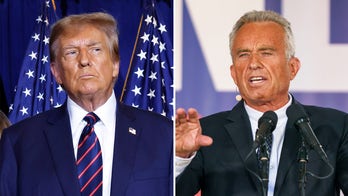Kurtz: Is the summit cancellation a blessing in disguise?
'MediaBuzz' host Howard Kurtz weighs in on President Trump cancelling the planned summit with North Korea leader Kim Jong Un.
President Trump's announcement that he would sit down with Kim Jong Un came as a global shock. His cancellation of the meeting, not so much.
You didn't have to be a master diplomat to discern that things were rapidly going downhill between the two countries. North Korea may well have backed him into a corner. And a president who places a premium on projecting strength was not going to stand for that.
Amid indications that Kim might back out of the June 12 summit in Singapore, Trump decided to strike first.
While experts analyze the verbal sniping that led up to the cancellation, I think that misses the larger point. When two world leaders want to meet, they ignore divisive rhetoric and sit down together. That was certainly the case with all those Soviet summits from Nikita Khrushchev to Mikhail Gorbachev.
Still, the atmosphere turned chilly from the moment that Kim objected to the U.S.-South Korea military exercises, which he'd previously said were fine. Then came North Korean objections to televised comments by John Bolton when the national security adviser said the administration would follow the Libya model for denuclearization—not exactly appealing words to the North Koreans, since Muammar Qaddafi wound up dead.
After Vice President Pence told Fox's Martha MacCallum that "this will only end like the Libya model ended if Kim Jong Un doesn't make a deal," the North’s foreign vice minister called Pence a "political dummy" and said it was up to the White House "whether the U.S. will meet us at a meeting room or encounter us at nuclear-to-nuclear showdown."
That may have been the last straw for Trump, who said earlier this week there was a "substantial chance" that the summit would not come off. Yesterday he pulled the plug. No matter that North Korea had just destroyed its nuclear test site, though some experts believe it had been damaged beyond repair.
Donald Trump often walks away from the table, or threatens to, as he did as a New York businessman. He has spoken of pulling out of NAFTA several times. He vowed to pull out of the Iranian nuclear deal before finally doing so.
This is, to him, a negotiating style, all part of what he once called the art of the deal. He is, after all, the man who repeatedly denounced Kim as Little Rocket Man and threatened to destroy his country if necessary before becoming his negotiating partner.
Indeed, Trump’s letter to Kim contained some conciliatory notes: "Someday, I look very much forward to meeting you ... If you change your mind having to do with this most important summit, please do not hesitate to call me or write."
That is called leaving the door open.
Some skeptics believed that Trump was giving Kim the world stature conferred by such a meeting without getting anything in return. Others said the U.S. wasn't ready for a nuclear summit, that enough groundwork hadn't been laid for successful talks. In this view, Trump was more interested in the optics of a splashy summit, and a potential Nobel Prize, than in doing the arduous work of negotiating a verifiable disarmament in exchange for the elimination of economic sanctions.
If that's true, the cancellation might buy more time for a successful summit down the road—if such a meeting ever materializes.





